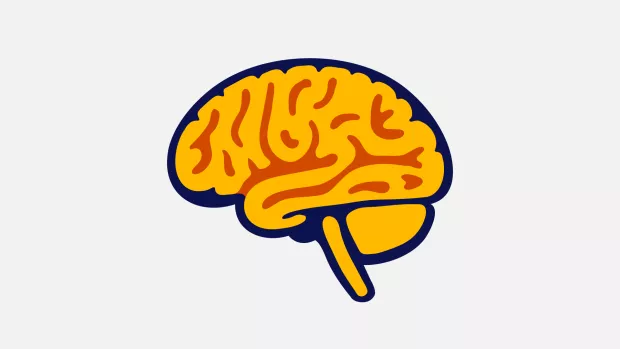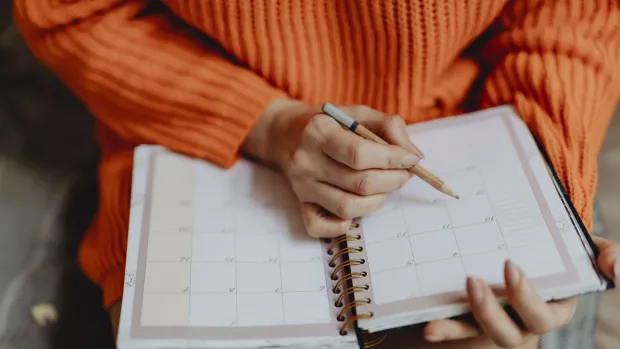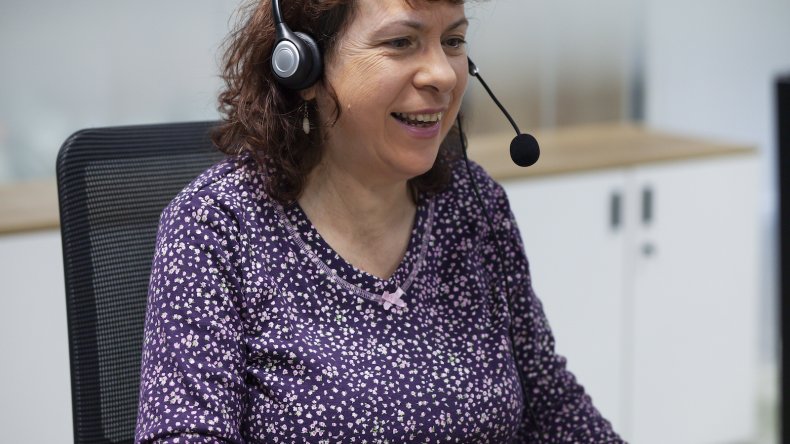
Tips for dealing with memory and thinking problems
If you have difficulties with memory or thinking, there are tips and strategies to manage these cognitive changes. They can help you keep up your lifestyle, relationships, and self-esteem.
Using these tips and aids could help you at work, home and in social events. And they won’t make your memory and thinking worse.
Give yourself some time to get used to using them. You might adapt some to make them work for you.
Health professionals can also help you understand and manage cognitive changes.
Tips and exercises for memory and thinking
We worked with physiotherapist Ruth to create some simple tips and exercises to help you with your memory and thinking. Introducing just a few small changes to your daily routine can make a big difference.
Watch our film to find out how these simple coping strategies help Tom, who's living with relapsing MS, and how they can help you, too. There is an audio described version of this video.
Lifestyle changes
There might be lifestyle changes you can make to keep your brain as healthy as possible. And this might help prevent cognitive symptoms from getting worse, or even improve them. Lots of different things could help, including:
- a healthy, balanced diet
- regular exercise
- stopping smoking
- restful sleep and relaxation
- managing stress
- doing mental exercises (for example, hobbies, education, reading, artistic expression)
Our tips for managing cognitive problems
I forget things easily
- Lots of people forget things, and getting stressed or upset about it will make it even harder to remember things. Relax, take a few moments to calm down – try slow, deep breathing or other relaxation exercises. After following these steps, you may find that you are able to remember what you had forgotten
- Different people remember things in different ways. You could write things down, or record them on your mobile phone
- You can use the built-in reminders, alarms and calendars on your mobile phone. Or send email reminders to yourself. You can also create notes or to-do lists using note apps on your mobile phone
- Rhymes, rules or phrases, or using music, may help you learn and remember things. For example, using a mnemonic to remember something that’s important to you. ‘Richard Of York Gave Battle In Vain’ is a mnemonic – used to remember the colours of the rainbow (Red, Orange, Yellow, Green…). A rhyme could be something like ‘i before e except after c’ to remember spelling rules (‘believe’ and ‘receive’)
I have trouble keeping track of what I'm supposed to do during the day
- Keeping a diary can help. It could be a paper or an electronic diary. Write down everything you plan to do during the day. Similarly, using an organiser, calendar, note apps or alarms on your mobile phone can help
- There are lots of phone apps available to help you remember appointments, names, and places. You can also use the camera function to help remember people, places, and activities. These can be the same apps that everyone uses – we all need help keeping track
- Try using the voice record function on your mobile phone to record notes to yourself
- Try to establish a routine for doing things, so there’s less for you to actively remember
- A whiteboard or a notepad in an obvious place at home might be good for jotting down notes to yourself. You might want others to add reminders for you too, if you’ve agreed you’d do something for them
I sometimes forget to take my medication
- You can ask at your pharmacy for your regular tablets to be put into 'pill boxes' or 'pill organisers'. That usually doesn't cost anything. The pharmacist can separate tablets according to morning, noon, teatime, and evening doses per day. That way, if you can’t remember if you've taken a tablet, you can check the pack
- Set reminders at the time you’re supposed to take your medication. You could use your mobile phone, a smart watch, your computer, laptop, tablet or an alarm clock
- You could also use a medication reminder app which reminds you when to take your medication
- Putting notes or ‘Post-its’ in obvious places can help. For example, if you take your tablets in the morning, a note stuck to the bathroom mirror might be enough to remind you
I find it hard to remember what I need to buy at the supermarket
- You could try making a master shopping list of things you regularly buy. You could print of lots of copies, or keep it on your phone. Before going to the shops, check the list and mark the items you’ve run out of
- If you do your shopping online, you could save 'favourites' or add items from your previous orders into your shopping basket
- You could use voice activated 'virtual assistant' apps on phones and other devices to make shopping lists and to set reminders throughout the day
- Sometimes, making a story containing the key things to remember also helps
I can get lost easily, even when I'm going somewhere I've been before
- You can use a sat nav or the map function of your phone. You could save common routes to 'favourites' to avoid having to retype them every time (such as 'home', or 'GP')
- Visualising can also help. For example, don’t just learn the directions for getting from A to B – picture the route. Using your phone, you can take photos of the route in case you forget it. Review the photos before you set off. Some navigation apps offer a photo view, instead of a simple map
- If you find you forget where you park your car while out shopping, you could try attaching something to the car aerial to help you see it
- Taking pictures with your phone might help. For example, to help you remember where you’ve parked your car, take a picture of the level and floor number in the parking lot
- You could mark where you park in your phone app and save the location for when you need to return
- You might want to download an app that can help your partner or family track you, so that if you’re lost, they can give you directions
I put things down and forget where I’ve put them
- Have a set place for essential things – like car keys, or your glasses – and always put them there
- If you find you’re still misplacing important things, keep everything in one place – for example, in a 'canvas tidy' over the kitchen door. Label the pockets to make it easier to know what should go where
I find it hard to keep track of what everyone in my family is doing, and where they are
- You could put up a large family calendar, a whiteboard or a magnetic fridge planner. Everyone in the household can write down what they’re doing and when. Check things off as they’re finished. There are similar options on mobile phone apps which you can share with people you choose
- Ask your family to remind you what they are going to do, and what they've done. Especially things that matter, like doctor’s appointments
I'm easily distracted, and sometimes forget what I'm doing in the middle of doing it
- Focus on one thing at a time. Turn off the TV, computer or radio. And try to reduce other distractions when you’re talking to someone or working on a particular task
- If you work at a desk, you might find it helps to keep it as clear as possible. If you can, have just what you’re working on next to you on the desk
- Try working somewhere where you're less likely to be distracted by other people
- Turn your phone off, put it on voicemail, or on silent mode, so you’re not interrupted
- Try to dedicate specific times to checking your emails and turn email notifications off. That way, you won't be distracted each time an email arrives in your inbox
- Tell people you’re easily distracted, and ask them to take this into account when they speak to you
- If you’re in an open plan or shared work space, consider speaking to your employer or manager to see what adjustments they can make for you. For example, some people find it useful to block out conversations or chatter from people around them by listening to music on headphones
I find it really difficult to concentrate sometimes
- Fatigue and tiredness can both affect concentration. Plan your work so that you’re doing your most demanding tasks when you’re at your best.
- Pace yourself, and give yourself regular breaks.
- Focusing on one task at a time can make it easier to concentrate.
- Try to work out what else affects your concentration: Room temperature? Time of day? Amount of sleep? Certain people being around, or not around? Background sounds? Food or drink? Can you control these things or take them into account when you need to concentrate?
I can’t always find the words I want to say – it’s like they’re on the tip of my tongue
- Try using other words to describe the word you want to use.
- Think of the words you think might be similar - or sound like - the one you're trying to remember. You might want to softly speak out the word
- When you’re trying to think of one name, think of links they have to others. For example, it might be easier to think of the name of a couple (like, 'Jo and Jerry') or a group of friends ('Jo, Sunil and Paul')
- Stressing about finding exactly the word you want to use is likely to make it harder to come up with it. Sometimes it’s helpful to leave it for a time. You might find the word you’re trying to remember comes back to you after a while
- Where it feels appropriate, tell those close to you about your word-finding problems - and how you’d like them to help. For example, ask them to prompt you if that’s what you prefer or find helpful. Or let them know when you don’t want them to do that
Following a conversation can be hard for me
- Letting people know that you’re struggling can avoid any misunderstandings. You can ask people to speak slower, or one at a time if it makes it easier for you
- Ask others for their patience or tell them that you just need a moment to think before you reply. That way you have time to gather your thoughts before expressing them
- If you find it easier talking one-to-one, consider asking people to talk to you on their own
- Whenever possible, suggest meetings in locations with fewer distractions. For example, use meeting rooms if you're in an office, or choose a quiet place to meet friends
I find it hard to think when I'm put 'on the spot'
- Ask for – or give yourself – more time to take in or retrieve new information. Tell other people that you need time to consider what was said and that you will get back to them as soon as possible. For example, you could get back to them by email
- Try to plan ahead as much as possible, to avoid situations where you'll have to respond very quickly
- Try to relax. Panicking is likely to make your attention, memory and thinking problems worse
When I get too hot, my thinking gets muddled
- There are things you could try to stay cool – such as having regular cold drinks, sucking on an ice cube or frozen fruit, or spraying cold water on your face and wrists
- A floor or desk fan can help to keep the temperature down and the air flowing in a room
- Specific cooling items are available, including cool scarves, ties, wristbands, hats and vests. An ice pack wrapped in a cloth inside a hat helps some people
- Avoid hot baths or showers if you find that it slows you down, or take hot showers after you have done the work that requires most concentration
Last full review: | Next review:
We also update when we know about important changes.




